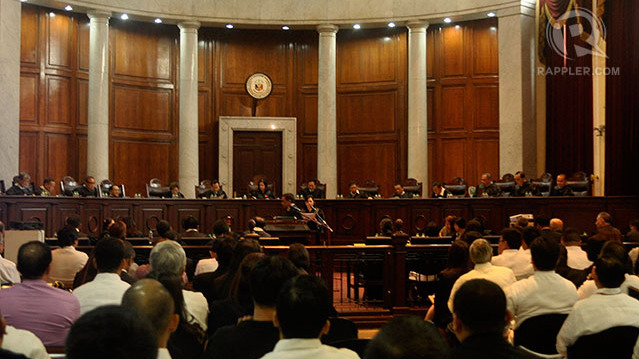SUMMARY
This is AI generated summarization, which may have errors. For context, always refer to the full article.

MANILA, Philippines – Congress on Tuesday, February 18, argued before the Supreme Court (SC) that petitioners against the Disbursement Acceleration Program (DAP) are not aggrieved parties in the implementation of the controversial spending program.
The legislature was represented by retired Justice Vicente Mendoza during the SC oral arguments. (READ: Congress turn to defend DAP before Supreme Court)
Mendoza said no controversy or case worthy of intervention by the High Court exists in the assailing of DAP, as the program has caused “no injury in fact” to the petitioners.
“What specific public right are petitioners seeking to vindicate?” Mendoza asked during his speech.
“Indeed, the requirement of case or controversy and of standing before a party can sue on constitutional grounds is not a mere technicality which may be conveniently set aside. It is a constitutional requirement,” he said.
The validity of DAP can be questioned before the Commission on Audit or before trial courts and not the SC, Mendoza added.
“There is absolutely no reason, except possibly politics, why the President of the Philippines, the Senate President, and the Speaker of the House of Representatives, should be included as respondents,” Mendoza said.
“The President is immune from suits when acting in his official capacity, at least during his tenure. Even freshman law students know this,” he said.
He added that the DAP was sanctioned through executive issuances, of which Congress had no hand.
The DAP is a system of realigning savings as well as unused funds from slow-moving projects of agencies to fast-disbursing government projects, programs, or activities, not necessarily within the same agencies.
The spending program was initiated by President Benigno Aquino III in 2011, allegedly to boost government spending and consequently the economy.
But Justice Antonio Carpio, during the interpellation, asked Mendoza: “Do you agree with me that a taxpayer has legal standing to question or prevent or assail the illegal disbursement of public funds?”
Mendoza, however, said that there is no law being assailed by the petitioners. DAP was sanctioned by the National Budget Circular No. 541 signed by Aquino’s cabinet official, Department of Budget and Management Secretary Florencio Abad.
Cross-border fund transfer
There was also a notable point raised during the second day of oral arguments: The President can’t use the Executive’s budget to augment what has been appropriated for lawmakers.
At least two justices said the DAP-sanctioned diversion of funds from the executive department’s savings to projects of senators is unconstitutional. (READ: Two justices say DAP releases to senators not allowed)
Abad earlier said the realignment was an exercise of the President’s power to augment as outlined in the Constitution:
Mendoza, however, said the realignment was not meant to augment a deficient item.
“Those are aids. They are not transfers like the transfer of savings. They are not. They are aids to independent branches of the government. And no money really went to the pockets of individuals. That makes it different from PDAF,” Mendoza said in an ambush interview.
Mendoza said there were only 6 cases of cross-border fund realignment.
Mendoza, upon being questioned by the magistrates, said the entities separate and independent from the executive department which were aided by DAP were “sorely in need of government funds.”
Carpio, in his line of questioning, hinted at Congress passing a supplemental budget which the President can certify as urgent as an alternative to DAP.
Hazardous to SC’s proper functioning
The SC, Mendoza added, will suffer if suits by individuals or groups “whose interest is no different from that of other citizens” are allowed to prosper in the High Tribunal.
Mendoza said the court will avoid “premature, abstract, and ill-informed judgements” only if it is able to appreciate a law’s impact on “real concrete situations,” hinting that DAP is neither enacted through law nor assailed on the basis of how it affected the populace.
Justice Lucas Bersamin acknowledged that filtering cases that the SC will hear based on reasonable standards “will really be helpful,” as the SC is “burdened with a big docket.”
“The court is really interested in devising means of filtering cases that go before the Court,” he said.
Mendoza said the “inevitable pressure generated by groups will deprive the court of the serenity and quiet so badly needed for reflection and sober judgment.” – Rappler.com
Add a comment
How does this make you feel?
There are no comments yet. Add your comment to start the conversation.